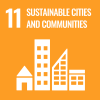Ngala, 30 October 2023 – Once a thriving mother, Zainab Muhammed’s conflicted experiences have left a mark of both resilience and frustration in the lines of her face. Over time, the ISS Internally Displaced Persons (IDP) camp in the small town of Ngala, Borno State, which was supposed to be a temporary passage to recovery, has become their only lifeline and a place her children reluctantly call home despite its deteriorating state.
Fourteen years since the Boko Haram conflict began, stabilizing Nigeria’s northeast region has become a daunting task, with emerging challenges characterized by conflict for resources between farmers and herders and climate factors such as floods, exacerbating the vulnerability of conflict-affected populations, prolonging the stay of over 2.2 million displaced people in camps and camplike settings in the region.
The challenges faced by Zainab are not peculiar to her alone; they are an embodiment of the realities of the everyday lives of IDPs in northeast Nigeria. The impact of this long-term displacement is the severe dependence on humanitarian aid for survival and a strain on the resources and capacity of aid organizations to meet ongoing needs effectively. Whereas humanitarian organizations and the governments of Borno, Adamawa, and Yobe (BAY) States are making conscious efforts towards conflict stabilization measures, other push factors, including the adverse effects of climate change and hazards, among other factors, are limiting access to livelihood opportunities and hampering the return intentions of displaced individuals to their locations of pre-displacement.
Zainab, in her late thirties, depicts not just the struggles faced by displaced people but also paints a vivid picture of the challenges that have beset the region. For her, the path to recovery seems to be a dull tale marked by uncertainty, vulnerability, and a life of dependency. Like many others, the single mother of seven children, once caught in the crossfire of the Boko Haram conflict, is still grappling with the harsh realities of life in a displacement camp.
"We have weathered the storms of conflict, and our altered lives seek a return to normalcy where we can be self-sufficient and embrace our once-separated families and support system while working towards securing a brighter future for our children," says Zainab.
Life in the camp is marred by overcrowding, and scaleup efforts to decongest it proved insufficient with new arrivals recorded every day, thus further reducing the living conditions of already vulnerable people, with many having to struggle with limited access to basic services.

Zainab Muhammed and her family outside a makeshift shelter in the ISS camp, Ngala, Borno State. Photo: IOM 2023/Elijah Elaigwu
Beyond the physical challenges, the protracted crisis has taken a toll on the mental and emotional well-being of most individuals, including Zainab.
"The trauma and the psychological scars of knowing that my children will never see their father again are forever etched in my heart and create a sense of helplessness and despair," Zainab shares.
Funding limitations are hindering efforts to improve the living conditions of those displaced like Zainab, further exacerbating the pre-existing challenges. For the past five years, the Camp Coordination and Camp Management (CCCM), Shelter, and Non-Food Item (NFI) sector has drastically been underfunded, receiving the least funding allocations of 33 per cent and 53 per cent of the required funding in 2022 despite the high number of arrivals at the reception centres overstretching their capacity by 235 per cent, making them extremely congested and uncomfortable.
Currently, over 263,000 IDPs have been forced to live in spontaneous camplike sites, in addition to the 1.3 million displaced population spread across 1,413 self-settled locations within host communities. These sites often lack proper infrastructure and access to humanitarian assistance, leaving IDPs exposed to various risks, including health hazards and insecurity.

Overly congested ISS camp in Ngala, Borno State. Photo: IOM 2023/Ovie Taghwo
The dire need for shelter as well as reinforcement, repair, or replacement of existing ones has become overly important to protect the most vulnerable, especially women and girls, who are exposed to violence and other forms of gender-based violations.
Addressing these pressing needs is essential for the transition process from emergency relief to development-oriented solutions that seek to achieve lasting stability by empowering displaced populations like Zainab to rebuild their lives through a multifaceted approach that includes upskilling, education, and livelihood support to reduce dependency on humanitarian aid as well as working towards sustainable solutions, such as local integration or resettlement, depending on the circumstances.
This story was written by Elijah Elaigwu, IOM Media and Communications Unit in Nigeria




